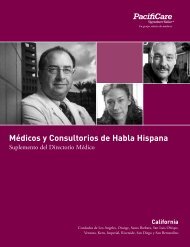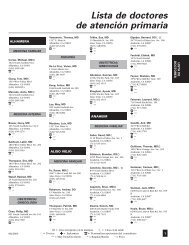CALIFORNIA - Pacificare Health Systems
CALIFORNIA - Pacificare Health Systems
CALIFORNIA - Pacificare Health Systems
You also want an ePaper? Increase the reach of your titles
YUMPU automatically turns print PDFs into web optimized ePapers that Google loves.
PART A<br />
124<br />
General Information<br />
the agreed-upon budget. If the actual cost of services<br />
is less than the agreed-upon budget, the Participating<br />
Medical Group shares in the savings. The Participating<br />
Hospital and Participating Medical Group typically<br />
participate in programs for Hospital Services similar to<br />
what is described above.<br />
Stop-loss insurance protects Participating Medical<br />
Groups and Participating Hospitals from large financial<br />
expenses for health care services. PacifiCare provides<br />
stop-loss protection to our Participating Medical<br />
Groups and Participating Hospitals that receive the<br />
monthly payments described above. If any Participating<br />
Hospital or Participating Medical Group does not<br />
obtain stop-loss protection from PacifiCare, it must<br />
obtain stop-loss insurance acceptable to PacifiCare.<br />
PacifiCare arranges with additional Providers or<br />
their representatives for the provision of Covered<br />
Services that cannot be performed by your assigned<br />
Participating Medical Group or Participating Hospital.<br />
Such services include authorized Covered Services<br />
that require a specialist not available through your<br />
Participating Medical Group or Participating Hospital or<br />
Emergency and Urgently Needed Services. PacifiCare or<br />
your Participating Medical Group pays these Providers<br />
at the lesser of the Provider’s reasonable charges<br />
or agreed-to rates. Your responsibility for Covered<br />
Services received from these Providers is limited to<br />
payment of applicable Copayments. (For more about<br />
Copayments, see Section 7. Payment Responsibility.)<br />
You may obtain additional information on PacifiCare’s<br />
compensation arrangements by contacting PacifiCare<br />
or your Participating Medical Group.<br />
How do I become an organ and tissue donor?<br />
Transplantation has helped thousands of people<br />
suffering from organ failure or in need of corneas, skin,<br />
bone or other tissue. The need for donated organs<br />
and tissues continues to outpace the supply. At any<br />
given time, nearly 50,000 Americans may be waiting for<br />
organ transplants while hundreds of thousands more<br />
need tissue transplants. Organ and tissue donation<br />
provides each of us with a special opportunity to help<br />
others.<br />
Almost anyone can be a donor. There is no age<br />
limit, and the number of donors age 50 or older has<br />
increased. If you have questions or concerns about<br />
organ donation, speak with your family, doctor or<br />
clergy.<br />
There are many resources that can provide the<br />
information you need to make a responsible decision.<br />
If you do decide to become a donor, be sure to share<br />
your decision. Sharing your decision to be an organ<br />
and tissue donor with your family is as important as<br />
making the decision itself. Your organs and tissue will<br />
not be donated unless a Family Member gives consent<br />
at the time of your death – even if you’ve signed<br />
your driver’s license or a donor card. A simple family<br />
conversation will prevent confusion or uncertainty<br />
about your wishes.<br />
It is also helpful to document your decision by<br />
completing a donor card in the presence of your family<br />
and having them sign as witnesses. The donor card<br />
serves as a reminder to your family and medical staff of<br />
your personal decision to be a donor. Carry it in your<br />
wallet or purse at all times.<br />
How can I learn more about being an organ<br />
and tissue donor?<br />
To get your donor card and information on organ and<br />
tissue donation call 1-800-355-SHARE or<br />
1-800-633-6562. You can also request donor<br />
information from your local Department of Motor<br />
Vehicles (DMV).<br />
On the Internet, contact:<br />
n<br />
n<br />
n<br />
All About Transplantation and Donation<br />
(www.transweb.org)<br />
Department of <strong>Health</strong> and Human Services<br />
(www.organdonor.gov)<br />
Once you get a donor card, be sure to sign it in<br />
your family’s presence. Have your family sign as<br />
witnesses and pledge to carry out your wishes, then<br />
keep the card with you at all times where it can be<br />
easily found.<br />
Keep in mind that even if you’ve signed a donor card,<br />
you must tell your family, so they can act on your<br />
wishes.<br />
How can I participate in PacifiCare’s Public<br />
Policy Participation?<br />
PacifiCare gives its Members the opportunity to<br />
participate in establishing the public policy of the<br />
<strong>Health</strong> Plan. One-third of PacifiCare of California’s<br />
Board of Directors is comprised of <strong>Health</strong> Plan<br />
Members. If you are interested in participating in the








